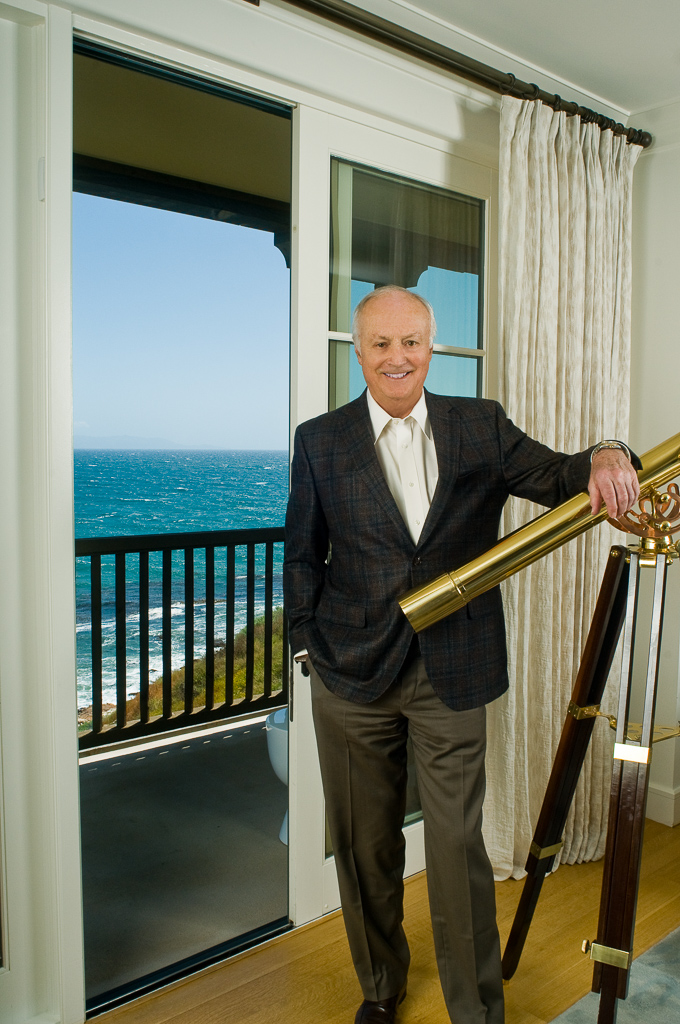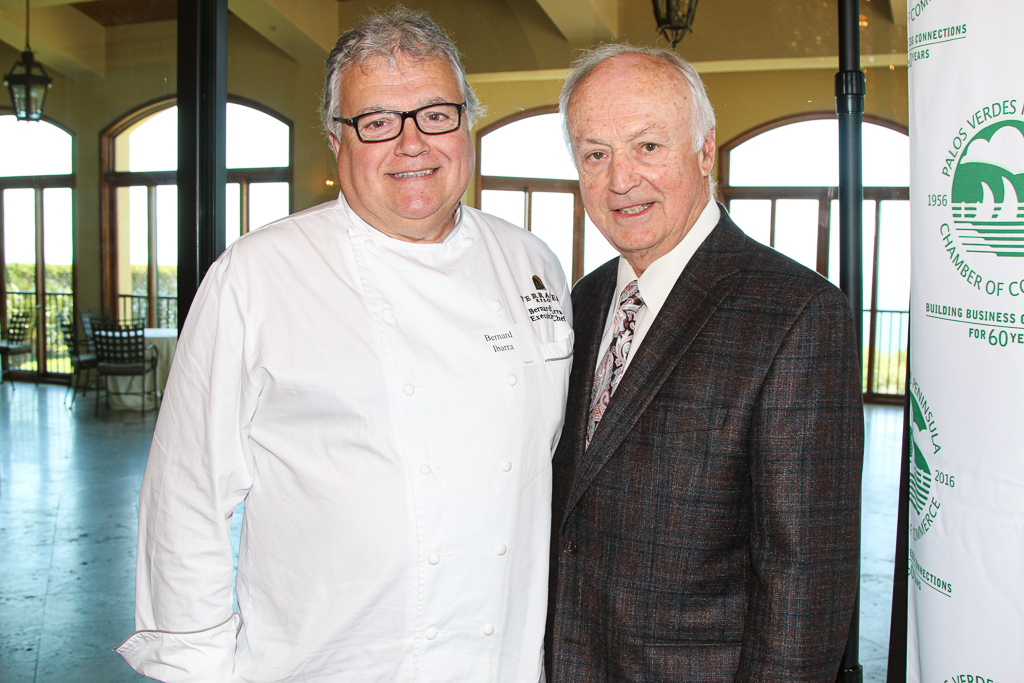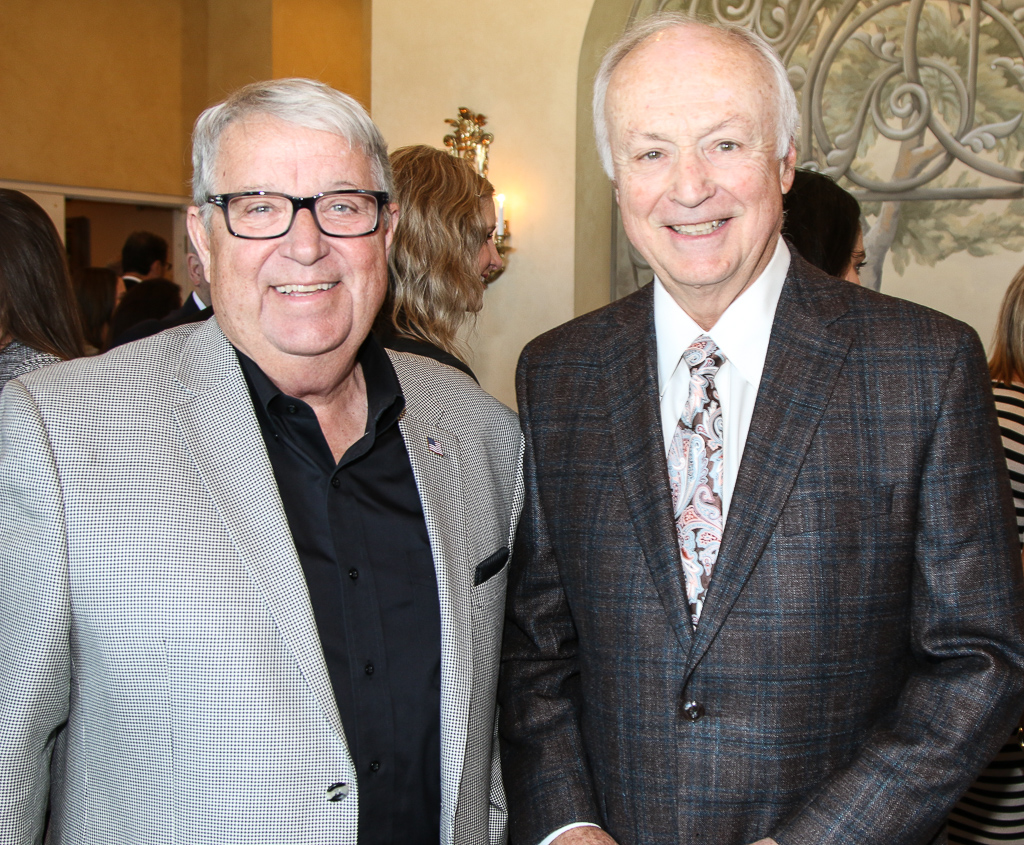Developer Bob Lowe looks back on 10th anniversary of Terranea Resort in Palos Verdes

Developer Bob Lowe in Terranea Resport’s 1,800 sq. ft. Presidential Suite. Photo by David Fairchild.
In the early 1970s, Bob Lowe brought his two young sons Michael and Robert to Marineland of the Pacific, “The World’s Largest Oceanarium.” The home of Bubbles the Whale was on Long Point, a small, west-pointing promontory in Rancho Palos Verdes, on the Palos Verdes Peninsula.
Lowe’s attention was drawn to Long Point again in 1987 by news that Marineland was closing, after 33 years. His interest increased on learning that Arizona developer James Monaghan had quickly purchased the 102-acre property for $24.5 million to build a resort hotel.
Then, in 1994, a real estate group led by Los Angeles Mayor Richard Riordan and Peninsula developer Jim York purchased Monaghan’s property out of bankruptcy. Lowe knew Riordan.
Lowe, who is prone to numbering his talking points, entered real estate immediately after obtaining a Stanford MBA in 1964.
“One, I wanted work that produced tangible and enduring results. Two, I’m analytical, and three, I didn’t want to work for a giant corporation,” he said during a recent interview in his Brentwood office.
At the time Lowe contacted Riordan and York about Long Point, in 1998, he had achieved two of his three goals through the real estate development and management company he founded in 1972.
And though he did end up working for a giant company, the giant company was his own. Today, Lowe has over 9,000 employees in 11 offices across the country. Its development and management work has totaled over $24 billion.
Lowe proposed to Riordan and York that they resurrect Monaghan’s hotel resort plan and that Lowe Enterprises serve as the managing partner. The hotel would be the only coastal resort in Los Angeles County, Lowe pointed out. The price he proposed was contingent on what the City of Rancho Palos Verdes and the California Coastal Commission would allow them build.
In the four years since the Riordan-York group had acquired the property, the only physical headway made toward developing it was removing the landmark sign that had held a lifesize sculpture of Bubbles the Whale. (After Marineland closed, Bubbles, a pilot whale, performed at SeaWorld until his passing in 2016).
Another nine years would pass before entitlements and financing were obtained and ground was broken on Terranea Resort, a nearly $500 million, 582-room full service hotel with a 9-hole golf course, 135,000 sq. ft of conference space and facilities adequate to hold five weddings, simultaneously.

Bob Lowe with Terranea Resorts Chef Bernard Ibarra at last week’s Palos Verdes Chamber lunch honoring Terranea Resort. Ibarra is credited with raising the bar for resort dining. Photo
Last week, the Palos Verdes Chamber of Commerce hosted a lunch at Trump National Golf Course, which is also in Rancho Palos Verdes, to celebrate Terranea’s 10th anniversary. Also honored at the lunch was Admiral Risty owner Wayne Judah, whose restaurant is closing this summer, after 53 years.
“I ate a lot of dinners at Admiral Risty before attending Rancho Palos Verdes council meetings,” Lowe said during his Chamber talk, titled “Lessons learned at Terranea.” “The dinners were enjoyable and the time well spent,” he said. In 2002, the council approved his project 5-0.
Lowe also talked about another restaurant meal that played a role in Terranea obtaining an important approval, this one from the California Coastal Commission for a swimming pool on the bluff overlooking the ocean.
“We were a vote short and were having lunch before the meeting. One of the commissioners, who opposed the pool was at a nearby table and started to choke. When he turned red, one of my staff grabbed him from behind and performed the Heimlich maneuver.
“As we left the dining room, Pete Douglas, the Commission’s executive director, tapped me on the shoulder and said, ‘I think you’ve got the vote you needed.’”
The Coastal Commission approved Terranea, including the bluffside pool, in 2003.
With the entitlements secured, Lowe spent the next four years planning the project and obtaining financing.

Terranea CEO Terri Haack with Lowe Enterprise co-CEO’s Mike and Bob Lowe in 2001, when their development was seeking Rancho Palos Verdes and California Coastal Commission approval. Photo by David Fairchild
“I remember walking through the ruins of what remained of Marineland and saying to my sons, ‘We have the opportunity of a lifetime to develop 100 acres in the midst of 20 million people. We better do it right.’”
A Los Angeles Times article on the day of the June 2009 grand opening, included the following observation from hospitality consultant Alan Reay: “This is probably the most challenging environment for hotels since the Great Depression. We haven’t seen [revenue] declines like this since 1931.”
“Two lessons stand out from that debacle,” Lowe told Chamber members. “One, you never know where a negative surprise might come from. The experts didn’t foresee the 2008 recession and we didn’t foresee our big Chicago Bank failing. And two, if you believe in a project and are consistent, you can achieve goals under challenging conditions.”
“I remember like it was yesterday when our lender called me and said he could not fund the final $25 million of the construction loan. Then two of our major investors, the Bill Gates group and the Teachers Union ran for the hills. Fortunately, Turner Construction, whom we’d work with in the past, agreed to complete the work.”

Former Los Angeles County Supervisor Don Knabe introduced Bob Lowe at the Chamber awards lunch. Photo
But that still left Terranea without operating funds to run the resort.
“Fortunately, we had Terri Haack as Terranea’s CEO. She developed a prepay program for customers that gave us money to pay the bills,” Lowe said.
But the fallout from their failed Chicago bank wasn’t over with the resort opening.
“That took two more years to resolve,” Lowe said. “It was complicated by the fact that the FSLIC (Federal Savings and Loan Insurance Corporation) had taken over our lender’s assets. The FSLIC staff was polite, but no one there could make a decision. Finally, Starlight Capital, a New York Real Estate fund, acquired our failed bank’s assets and we were able to work with them to get new equity partners,” Lowe said during his talk.
As the economy recovered, Terranea Resort racked up local and national awards. Last year, it received the Conde Nast Traveler’s Readers Choice Award for best resort in Southern California. Also last year, Terranea received the National Geographic Traveler gold award for sustainable tourism. Eighty percent of its waste is recycled, employee uniforms are made of bamboo, wool, cotton or hemp and its golf tees are biodegradable.
Terranea has paid Rancho Palos Verdes an average of $5 million a year in Transient Occupancy Taxes.

Bob Lowe (center) with members of the Terranea staff and Palos Verdes Chamber board. Photos
At last week’s lunch the Peninsula Chamber awarded Terranea its Economic Development Impact Award.
Prestigious conferences Terranea has hosted include CODE, the leading tech industry gathering. Last year’s speakers included Uber CEO Dara Khosrowshahi, Snap CEO Evan Spiegel, 21st Century Fox CEO James Murdoch, Alibaba co-founder Joe Tsai and U.S. Senator and vice chair of the Senate Intelligence Committee Mark Warner.
Lowe said when he founded his company, his strategy was to balance high profit, high risk development with less volatile hotel management services.
His company is currently developing a resort hotel on the Charleston waterfront, a 650 room hotel in Mission Valley (near San Diego), urban rental projects in Oakland, Seattle and Los Angeles and the six-acre Ivy Station next to the Culver City metro station. Ivy Station will include 200 apartments, a 150-room hotel, 50,000 sq. feet of retail and 240,000 sq. ft. of offices. The Ivy office space has all been leased to HBO for its national headquarters.
Lowe’s Coral Tree Hospitality division manages dozens of hotels, among them the Hotel Carlton in San Francisco, Hotel Talisa in Vail, Hotel Lincoln in Chicago, Town and Country in San Diego, and Terranea.
 Lowe acknowledged that after nearly a decade of economic expansion, a correction or downturn is due. But he said he is confident the hospitality industry will continue to grow.
Lowe acknowledged that after nearly a decade of economic expansion, a correction or downturn is due. But he said he is confident the hospitality industry will continue to grow.
“Even though communications have changed, organizations still like face-to-face meetings,” he said.
Locally, Lowe said, he considered, but decided against making an offer on the 57-acre AES Power Plant property in Redondo Beach. Developing the environmentally challenged site would be “too complex,” he said.
He did submit a proposal to redevelop Redondo’s pier and harbor area, and expressed relief that he lost out to El Segundo-based developer CenterCal. In 2016, the Redondo City Council approved CenterCal’s development proposal. In 2017, a newly elected council unilaterally terminated the agreement. CenterCal is suing the city for breach of contract.
Lowe was uncharacteristically equivocal when asked if Terranea could receive government approval today.
“We were fortunate because Long Point had previously been developed by Marineland. It would have been more difficult had it been natural terrain. If there is another site on the coast that has been previously developed and an appropriate plan with good public access is proposed, perhaps it could be approved,” he said. Pen


